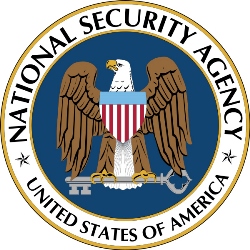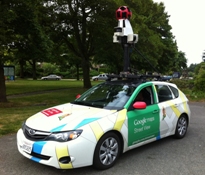It’s OK to Use the NSA Logo While Commenting on the NSA
 A couple of weeks ago Salon reported that the NSA had allegedly sent a request to self-printing site Zazzle asking that it take down a parody t-shirt that used an altered version of the NSA logo. When contacted, the NSA first claimed that “[t]he NSA seal is protected by Public Law 86-36, which states that it is not permitted for ‘ . . . any person to use the initials “NSA,” the words “National Security Agency” and the NSA seal without first acquiring written permission from the Director of NSA.'” But shortly after that, the NSA updated its statement to add that it had not contacted Zazzle to request the removal of any item since 2011, when it asked that a coffee mug with the NSA seal be removed from the site.
A couple of weeks ago Salon reported that the NSA had allegedly sent a request to self-printing site Zazzle asking that it take down a parody t-shirt that used an altered version of the NSA logo. When contacted, the NSA first claimed that “[t]he NSA seal is protected by Public Law 86-36, which states that it is not permitted for ‘ . . . any person to use the initials “NSA,” the words “National Security Agency” and the NSA seal without first acquiring written permission from the Director of NSA.'” But shortly after that, the NSA updated its statement to add that it had not contacted Zazzle to request the removal of any item since 2011, when it asked that a coffee mug with the NSA seal be removed from the site.
Putting the two statements together, it looked as though someone at Zazzle, remembering the earlier incident, mistakenly thought that all uses of the logo were forbidden. It seemed to be an isolated incident.
Except that now it’s happened again. This time, a computer science professor at Johns Hopkins, Matthew Green, received a request from his dean that he pull down a blog post on university servers that linked to some of the leaked NSA documents and contained the NSA logo. The university later confirmed that the reason for the request was that it “received information” that Green’s post “contained a link or links to classified material and also used the NSA logo.”
Before this emerging folklore about the NSA logo gets any stronger, let’s be clear: the NSA misquoted the statute in its response to the Salon story. Use of the NSA logo merely to criticize or comment on the NSA is not illegal; and even if Congress tried to make it illegal, it would likely violate the First Amendment, as Eugene Volokh has noted.

 (This is Part 2 of 4 posts on the issue of whether the Wiretap Act bars interception of unencrypted wi-fi signals. See
(This is Part 2 of 4 posts on the issue of whether the Wiretap Act bars interception of unencrypted wi-fi signals. See